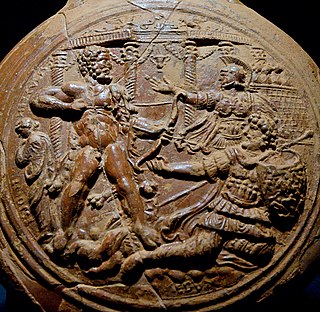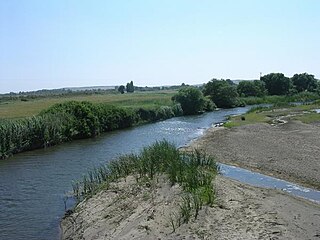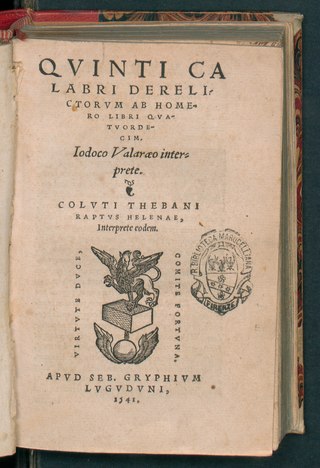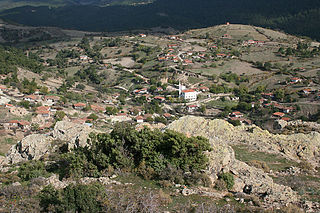Related Research Articles

The Judgement of Paris is a story from Greek mythology, which was one of the events that led up to the Trojan War, and in later versions to the foundation of Rome.

The Trojan War was a legendary conflict in Greek mythology that took place around the 12th or 13th century BC. The war was waged by the Achaeans (Greeks) against the city of Troy after Paris of Troy took Helen from her husband Menelaus, king of Sparta. The war is one of the most important events in Greek mythology, and it has been narrated through many works of Greek literature, most notably Homer's Iliad. The core of the Iliad describes a period of four days and two nights in the tenth year of the decade-long siege of Troy; the Odyssey describes the journey home of Odysseus, one of the war's heroes. Other parts of the war are described in a cycle of epic poems, which have survived through fragments. Episodes from the war provided material for Greek tragedy and other works of Greek literature, and for Roman poets including Virgil and Ovid.

In Greek mythology, Laomedon was a Trojan king, son of Ilus and thus nephew of Ganymede and Assaracus.

In ancient Greek religion and Greek mythology, Dione is an oracular goddess, a Titaness primarily known from Book V of Homer's Iliad, where she tends to the wounds suffered by her daughter Aphrodite. Dione is presented as either an Oceanid, daughter of Oceanus and Tethys, or the thirteenth Titan, daughter of Gaia and Uranus.

Karamenderes is a river located entirely within the Çanakkale Province of Turkey. It flows west from Mount Ida and empties into the Aegean Sea near the Troy Historical National Park. According to the Iliad, the battles of the Trojan War were fought in the lower courses of Karamenderes.

The Dardanoi were a legendary people of the Troad, located in northwestern Anatolia. The Dardanoi were the descendants of Dardanus, the mythical founder of Dardanus, an ancient city in the Troad. A contingent of Dardanians figures among Troy's allies in the Trojan War. Homer makes a clear distinction between the Trojans and the Dardanoi, however, "Dardanoi"/"Dardanian" later became essentially metonymous–– or at least is commonly perceived to be so–– with "Trojan", especially in the works of Vergil such as the Aeneid.
The Cypria is a lost epic poem of ancient Greek literature, which has been attributed to Stasinus and was quite well known in classical antiquity and fixed in a received text, but which subsequently was lost to view. It was part of the Epic Cycle, which told the entire history of the Trojan War in epic hexameter verse. The story of the Cypria comes chronologically at the beginning of the Epic Cycle, and is followed by that of the Iliad; the composition of the two was apparently in the reverse order. The poem comprised eleven books of verse in epic dactylic hexameters.
Aristonicus of Alexandria was a distinguished Greek grammarian who lived during the reigns of Augustus and Tiberius, contemporary with Strabo. He taught at Rome, and wrote commentaries and grammatical treatises.

Ithaca was, in Greek mythology, the island home of the hero Odysseus. The specific location of the island, as it was described in Homer's Odyssey, is a matter for debate. There have been various theories about its location. Modern Ithaca has traditionally been accepted to be Homer's island.
Gargara was an ancient Greek city on the southern coast of the Troad region of Anatolia. It was initially located beneath Mount Gargaron, one of the three peaks of Mount Ida, today known as Koca Kaya. At some point in the 4th century BCE the settlement moved approximately 5.8 km south of Koca Kaya to a site on the small coastal plain near the modern villages of Arıklı and Nusratlı, at which point the previous site came to be known as Old Gargara. Both sites are located in the Ayvacık district of Çanakkale Province in Turkey.

The Posthomerica is an epic poem in Greek hexameter verse by Quintus of Smyrna. Probably written in the 3rd century AD, it tells the story of the Trojan War, between the death of Hector and the fall of Ilium (Troy). The poem is an abridgement of the events described in the epic poems Aethiopis and Iliou Persis by Arctinus of Miletus, and the Little Iliad by Lesches, all now-lost poems of the Epic Cycle.

The Trojan Battle Order or Trojan Catalogue is an epic catalogue in the second book of the Iliad listing the allied contingents that fought for Troy in the Trojan War. The catalogue is noted for its deficit of detail compared to the immediately preceding Catalogue of Ships, which lists the Greek contingents, and for the fact that only a few of the many Trojans mentioned in the Iliad appear there.
Demetrius of Scepsis was a Greek grammarian of the time of Aristarchus and Crates, the first half of the second century BC. He is sometimes simply called the Scepsian, and sometimes simply Demetrius.

Scepsis or Skepsis was an ancient settlement in the Troad, Asia Minor that is at the present site of the village of Kurşunlutepe, near the town of Bayramiç in Turkey. The settlement is notable for being the location where the famous library of Aristotle was kept before being moved to Pergamum and Alexandria. It was also home to Metrodorus of Scepsis and Demetrius of Scepsis.

The Iliad is one of two major ancient Greek epic poems attributed to Homer. It is one of the oldest extant works of literature still widely read by modern audiences. As with the Odyssey, the poem is divided into 24 books and was written in dactylic hexameter. It contains 15,693 lines in its most widely accepted version. Set towards the end of the Trojan War, a ten-year siege of the city of Troy by a coalition of Mycenaean Greek states, the poem depicts significant events in the siege's final weeks. In particular, it depicts a fierce quarrel between King Agamemnon and a celebrated warrior, Achilles. It is a central part of the Epic Cycle. The Iliad is often regarded as the first substantial piece of European literature.
Rhoiteion was an ancient Greek city in the northern Troad region of Anatolia, also known as Ῥοίτιον ἄκρον. Its territory was bounded to the south and west by the Simoeis river and to the east by Ophryneion. It was located on the Baba Kale spur of Çakal Tepe north of Halileli and west of İntepe in Çanakkale Province, Turkey.
In Greek mythology, Ilus was the founder of the city called Ilios or Ilion to which he gave his name. When the latter became the chief city of the Trojan people it was also often called Troy, the name by which it is best known today. In some accounts, Ilus was described to have a plume of horsehair.
In Greek mythology, Amyntor was the son of Ormenus, and a king of Eleon or Ormenium. Amyntor's son Phoenix, on his mother's urgings, had sex with his father's concubine, Clytia or Phthia. Amyntor, discovering this, called upon the Erinyes to curse him with childlessness. In a later version of the story, Phoenix was falsely accused by Amyntor's mistress and was blinded by his father, but Chiron restored his sight.
In the Greek mythological tradition, Otreus was the legendary founder of Otrea in southern Bithynia. His name has also been linked to Otrous, a Phyrgian town on the Eucarpitic plain. He is possibly depicted on coins found in the area of Ilium.
References
- 1 2 3 4 5 6 J. V. Luce (11 December 1998). Celebrating Homer's Landscapes: Troy and Ithaca Revisited. Yale University Press. p. 132. ISBN 978-0-300-07411-6. Archived from the original on 3 June 2024. Retrieved 14 September 2012.
- ↑ Sarah B. Pomeroy (1990). Women in Hellenistic Egypt: From Alexander to Cleopatra. Wayne State University Press. p. 61. ISBN 978-0-8143-2230-7. Archived from the original on 3 June 2024. Retrieved 14 September 2012.
- ↑ A. Pertusi, ed., Scholia vetera in Hesiodi opera et dies (Milan: Vita e Pensiero, 1955) line 65.
- ↑ From the so-called D-scholia or pseudo-Didymus. C. G. Heyne, ed., Homeri Ilias (Oxford, 1834) book 3 line 64